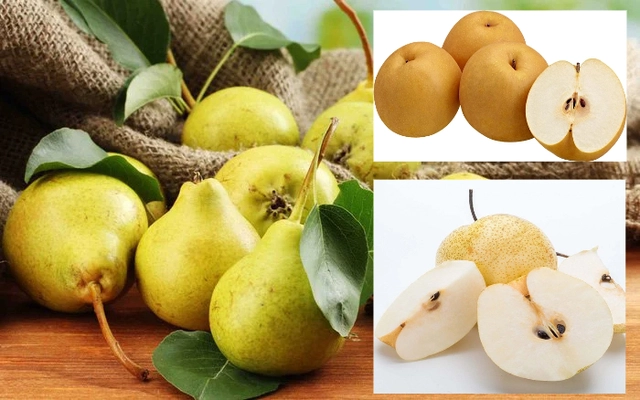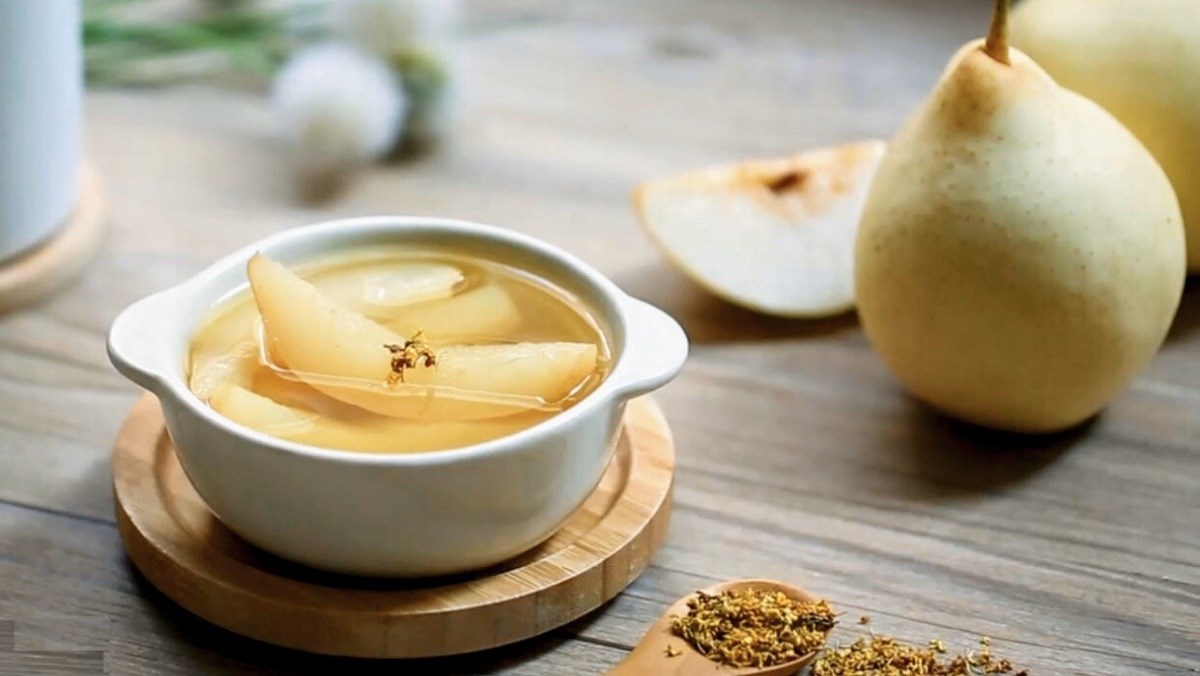Pears are one of the most popular fruits that are delicious and extremely nutritious. Eating pears regularly will help us improve constipation, fatigue, high blood pressure and limit type 2 diabetes as well as countless other wonderful benefits for health.
1. What do you know about pears?
The English name of pears is Pears, in Germany people often call this fruit Per Per. In Asia, pears also have many other names such as khoai qua, mat van, ngoc nhu, … or in Vietnam we often call pears mac cop.
Initially, pears were found in Europe, belonging to the pyrus caucasica and pyraster families. Their ancestors date back to ancient times when the Romans cultivated them and over time, pears were propagated by humans in most of the world’s silk fields.
The fruiting time is usually from August to October depending on the variety. The general identifying feature of pears is that they are elongated, bulging at the lower abdomen and tapering towards the stem, there are also types that are round.
The pear skin is thick and often light green, brown, yellow, red-yellow, but the most common is the yellow-skinned pear, which is the South African pear variety. Touching the skin will feel rough, slightly rough and have tiny light brown dots. The flesh of the pear is white or slightly yellow, very thick, sweet and juicy, when bitten it will feel crunchy.
There are 3 main types of pears as follows:
- Sugar pear: yellow skin, egg-shaped fruit, sweet and fragrant flavor, crispy flesh, average weight from 200 – 250g/fruit;
- Brown pear: slightly round and flat shape, delicious flesh when ripe. Each fruit weighs on average from 200 – 300g;
- Green pear: characteristic green skin mixed with a little cream yellow and red. The outer skin is shiny and smooth. The top of the fruit is elongated and the bottom is large. On average, each green pear weighs from 230 – 300g.

Distinctive characteristics of pear varieties
According to nutritionists, on average 100g of pears provide many beneficial nutrients, including: calcium, fiber, potassium, protein, phosphorus, and other essential vitamins such as A, B, C. Every 100g of pears will contain 0.5mg of iron, 86.5g of water, 0.2g of protein, 0.1g of fat, 11g of carbohydrates, 14mg of calcium, 13mg of phosphorus, 1.6g of fiber, 1mg of folic acid, vitamins P, C and beta carotene, 0.2g of vitamin PP,…
2. Pears and their health benefits
Looking at the nutritional composition table of pears, we can also see that this fruit is really beneficial to human health. Therefore, nutritionists also advise that we should eat pears every day so that the body can receive the following benefits:
- Prevent inflammation: the active ingredients contained in pears help reduce pain and inflammation caused by arthritis;
- Supplement fiber, improve the digestive system: fiber is very good for the digestion process, so those with diarrhea, constipation, and dehydration can add pears to their daily nutritional menu;
- Enhance resistance: vitamins (B2, B3, B6, C and K), minerals (magnesium, calcium, manganese, copper, folate) contained in pears have the effect of strengthening the immune system, fighting pathogens that enter the body;
Reduce blood cholesterol levels thanks to the activity of fiber and pectin contained in pears;
- Reduce the risk of type 2 diabetes: anthocyanin found in pears helps control blood sugar levels, which is very beneficial for patients with type 2 diabetes;
- Fight against free radicals: pears contain a lot of vitamin C, K, and copper minerals, which help protect the body from the destruction of free radicals;
- Lose weight: the calorie content in pears is quite low, combined with the abundant amount of fiber that helps you feel full for a long time, making it very suitable for those who are planning to lose weight;
- Protect cardiovascular health: antioxidants secreted by pears help limit atherosclerosis and platelet aggregation to form blood clots in the blood vessels. Therefore, eating pears will help reduce the risk of stroke, heart attack and other cardiovascular diseases;
- Cancer prevention: thanks to the ability of fiber in pears to bind with secondary bile acids, we can prevent the risk of colon cancer or other intestinal problems;
- Reduce the risk of osteoporosis: trace minerals and especially boron in pears help the body increase its ability to absorb calcium, which is very beneficial for the development of the skeletal system. If the body is deficient in boron, it will reduce the ability to absorb magnesium, phosphorus, … this is one of the causes of calcification and osteoporosis.

You should eat pears regularly to receive the beneficial nutrients contained in this fruit.
In addition to the above benefits, regularly eating pears also helps to overcome gingivitis, sore throat, fatigue, yellow urine, red eyes and high blood pressure,…
3. Some notes when eating pears
3.1. Who is not suitable for pears?
Although the delicious taste and nutritional value of pears cannot be denied, people with the following health problems should not eat this fruit:
- Patients with colds, colds, digestive disorders, or cold stomachs should not eat pears. The reason is that pears are cold in nature, and eating pears in these cases will make the symptoms of the disease worse;
- Postpartum women, people with weak spleen and stomach, children under 6 months old, and people with skin injuries are also not suitable for eating pears because it will affect the spleen and stomach.
3.2. What foods should not be eaten with pears?
If pears are combined with other foods, it can cause dangerous side effects, including poisoning. Below are foods that should not be eaten at the same time as pears:
- Goose meat: goose meat contains a high amount of protein and fat, pears are cold fruits, if combined together, they will cause the kidneys to be overloaded;
- Radish: the sulfuric cyanogen acid in radishes when combined with copper ketones in pears will cause goiter and hypothyroidism in patients;
- Amaranth: eating amaranth with pears can cause patients to have increased symptoms such as nausea and digestive disorders;
- Hot water: pears are cold, when used with hot water, they will cause conflicts in the digestive tract, easily leading to diarrhea.
Thus, it can be seen that pears are a priceless gift that nature has given to humans. This fruit not only has high nutritional value but also has effective medicinal properties. Therefore, you should eat more pears to improve your health!





